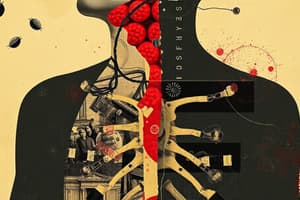Podcast
Questions and Answers
A child referred to your clinic as he had an anaphylactic reaction inform of urticaria and hypotension. That happened when he underwent a radiocontrast study in last week. They are asking for your advice regarding future radiocontrast study. What will you till the family?
A child referred to your clinic as he had an anaphylactic reaction inform of urticaria and hypotension. That happened when he underwent a radiocontrast study in last week. They are asking for your advice regarding future radiocontrast study. What will you till the family?
- Avoid radiocontrast
- Provide premedication with anti-histamine and steroid (correct)
A 4 months old infant presented to your clinic with history of blood in stool. He has good weight gain with no other significant findings. His mother is giving him formula feeding along with breastfeeding. She also gave him some solid foods 1 week ago. What will you do next for him?
A 4 months old infant presented to your clinic with history of blood in stool. He has good weight gain with no other significant findings. His mother is giving him formula feeding along with breastfeeding. She also gave him some solid foods 1 week ago. What will you do next for him?
- Trail of exclusive breast milk (correct)
- Discontinue breastfeeding
A 4 months old infant presented to your clinic with history of blood in stool. He is on both breast and formula feed. His mother recently introduced food for him. What will you do next for him?
A 4 months old infant presented to your clinic with history of blood in stool. He is on both breast and formula feed. His mother recently introduced food for him. What will you do next for him?
- Start hydrolyzed formula (correct)
- Start exclusive diary diet
- Start gluten free diet
- Reassurance
A medical intern is asking you about food cross reactivity. Which of the following statement is right?
A medical intern is asking you about food cross reactivity. Which of the following statement is right?
Study Notes
Anaphylactic Reaction and Radiocontrast Studies
- A child experienced an anaphylactic reaction characterized by urticaria (hives) and hypotension during a radiocontrast study.
- Advise the family against future radiocontrast studies, as the child has a confirmed allergic reaction.
- Suggest consideration of alternative imaging methods that do not require contrast agents, if possible.
Blood in Stool in Infants
- A 4-month-old infant presented with blood in the stool, but exhibits good weight gain and otherwise normal findings.
- History includes feeding on formula, breast milk, and recently introduced solid foods.
- Investigate potential causes such as food allergies, especially following the introduction of solids.
- Recommend conducting stool tests and possibly evaluating for any food allergies or intolerances.
Food Introduction and Reactions
- For the same 4-month-old infant with blood in stool after the introduction of solid foods, monitor for signs of allergic reaction or gastrointestinal issues.
- It is essential to review the types of solid foods introduced to identify potential allergens.
- Consider re-evaluating the diets to exclude newly introduced foods which might be causing the blood in the stool.
Food Cross Reactivity
- Food cross-reactivity refers to the occurrence of allergic reactions to different foods that share similar protein structures.
- Educate the medical intern that a proper understanding of cross-reactivity is essential for managing food allergies and advising patients.
- Clarification on which foods are known to cross-react, such as specific tree nuts, peanuts, and certain fruits, is necessary for safe dietary guidance.
Studying That Suits You
Use AI to generate personalized quizzes and flashcards to suit your learning preferences.
Description
A child experiences an anaphylactic reaction after a radiocontrast study, causing urticaria and hypotension. What advice would you give to the family for future radiocontrast studies?



